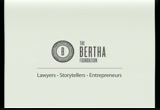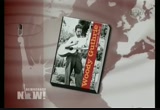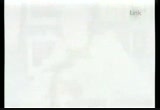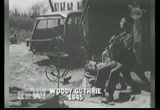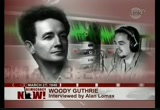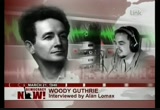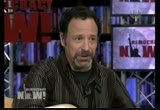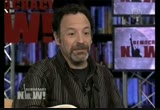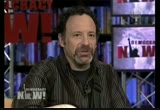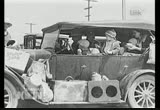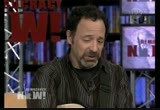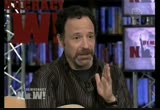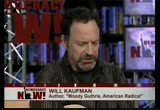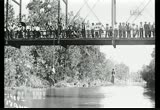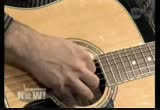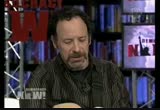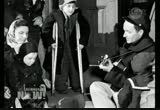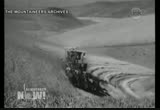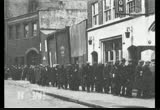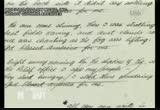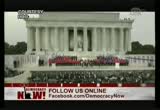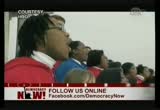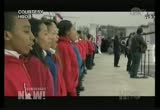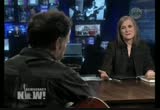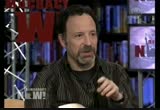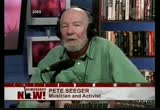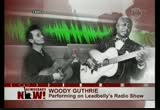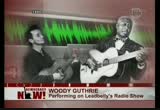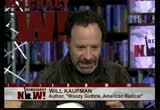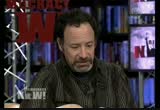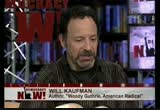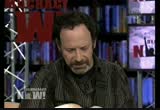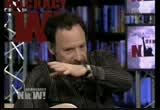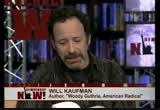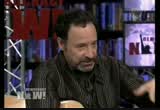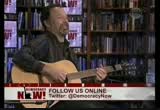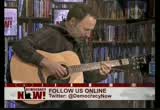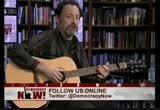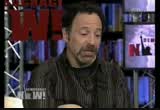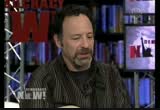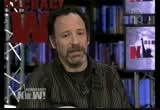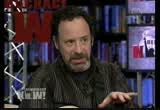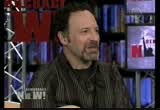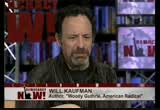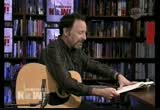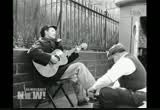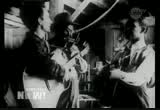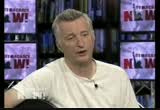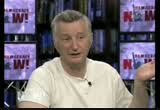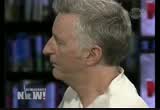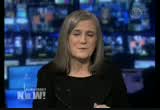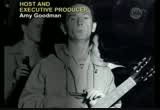tv Democracy Now LINKTV July 4, 2012 8:00am-9:00am PDT
8:00 am
07.02.12 07.02.12 [captioning made possible by democracy now!] >> this is democracy now!, democracynow.org, the war and peace report. from pacifica, this is democracy now! >> this land was made for you and me. >> it democracy now! special on the life, politics, and music of woody guthrie. born in 1912 in oklahoma, we was
8:01 am
bic with british protest singer billy bragg. >> history has a habit of repeating itself every now and then. the songs that he was riding in the 1930's, 1940's, and 1950's can have an amazing relevant for what is going on now. i think it is about time people started listening to willie guthrie again. >> and we hear the legendary folk singer pete seeger describe his first meeting with woody guthrie. >> after 20 minutes he took over and entranced everybody with his singing and storytelling. >> i come from oklahoma, you know. if you want lead, we have led. " down a hole and get you some lead. cold? go down a hole and get you some coal.
8:02 am
food, clothes, groceries, just go down all and stay there. >> this is democracy now!, democracynow.org, the war and peace report. i'm amy goodman. commemorations are being held across the country this year to mark the 100th anniversary of the birth of one of the country's greatest songwriters it would be cut three. born on july 14 1912, would the guthrie wrote hundreds of folk songs including this lot is your land, and this song, the rangers command. >> one of them lost in the archives for 40 years was only just come to life. broke of ustler's
8:03 am
in the dead hours of night she rose from her blanket a battle to find she rose from her blanket with a gun in each and said come on all your cowboys fight for your land. >> a rare recording of woody guthrie. he became a major influence on countless musicians, including bob dylan, bruce springsteen, pete seeger, and bill oakes. while guthrie is best remembered as a musician, he also had a political side. he spoke out for label and civil rights and against fascism. he died in 1967 after a bout
8:04 am
with huntington's disease. over the next hour, we will hear from pete seeger, billy bragg, and will coffman. first, woody guthrie, in his own words, being interviewed by a musicologist. >> what kind of family did you come from? what kind of people are they? >> they come in from texas. in the early days, my dad came to oklahoma. he was the first clerk of the county court in oklahoma. after statehood, known as one of those old, hard hitting, fist fighting democrats. he used to discount the votes all the time. every time my dad went to town, it was common, the first question i would ask him when they came in writing on the horse that evening i would say,
8:05 am
well, how many fights did you have today? he would take me up on his knee and tell me who he was fighting, why, all about it. why don't we show a couple of these fascists what a hillbilly can do it. i was born in that little town. dad build a six-room house. cost him about $7,000. the day after, it burned down. >> how big was the place? >> in those days, about 1500. a few years later, about 5000. struck some pretty rich oil pools all-around there in garrison kitty, cromwell, seminole, sam springs, spring hill, all up and down the whole country they have oil.
8:06 am
pretty nice old fields. >> any of the oil coming your family? >> no, we got the grease. we turn now to go coffman. kaufman is a professor of american literature and culture at the university of like richest third in central england. i interviewed kaufman recently and ask him to talk about woody guthrie's childhood. >> he was born in okey mike, oklahoma in 1912. he was born into a middle-class fairly light ring family. his father was a small-town politician, a real-estate agent, support of the ku klux klan. >> some say he was a klansman. >> there is no documentary evidence to from the support
8:07 am
that he was, but no doubt he supported them. there is some anecdotal evidence that he sometimes wrote out with them on their adventures and may have participated in a lynching. that affected woody years later. there is no indication that woody was particularly all the political growing up. and after a number of family tragedies, like the burning down of their house, the death of his older sister and a house fire, a near fatal burning of his father, and the incarceration of his mother at the oklahoma state mental asylum. she was not crazy but she had the misunderstood huntington's disease. after all this, we went to join his father and another boom to bust town in texas. he dropped out of high-school and after two years to become a sign painter, married, had his
8:08 am
first two children, and then sat there and watched as the dust bowl hit the center of the united states. tens of thousands of destroyed farmland wiped out. woody was there. he began to write about the dust. back in 1927 i had a little farm that i called have been bought clothes and groceries fed the kids and raised a family rain quit and the wind got high i swapped my farm for export machine i forecast in the machine and it started rocking and rolling >> some of those dust bowl ballads came out of his late teens and early 20's.
8:09 am
then he joined about half a million other migrants heading west towards california where they heard there was lots of work out there. of course, they were wrong. it is very california where woody hooks up with the right people, i suppose, and gets involved in the popular front out there. this is the beginning of his politicization, as you say, began writing columns for "the people's world" out there in los angeles, got a show on a progressive reputation and los angeles -- radio station in los angeles, and begins to go to the migrant camps where they would be living in old dwellings of packing crates, the bodies of
8:10 am
abandoned cars, under bridges, rivers, getting their heads broken when they dared to organized into unions. woody began to witness that and began to write about it. he began to see music as a political weapon that way. >> talk about 1937, the turning point for woody guthrie, as he takes on racial issues. >> he arrived in california, i think, with the influence of having grown up in a state been -- that have been dominated by the klan, and a family that supported the klan. he was not all that racially in mind when he went out to california. there is evidence that he would write these mock poems about african-americans bathing on the beach in santa monica, giving off the ethiopian smell, gentle rhythms pounding in their veins.
8:11 am
he happily sang songs using the n-word, using words like croon and stuff like that, which was part of the white mountain tradition. so he is on his radio station sometime in 1937 and he announces he will play a song from uncle dave macon, the grand ole opry. a lovely song called run, nigger, run. he announces it and plays it. he gets a letter from a member of the listening audience the next day. i know that letter by heart. he said, you're getting along pretty well in your program tonight until you announced your nigger blues. i am a young negro in college and i certainly did not like your mark. no person of any intelligence uses that word over the radio
8:12 am
today. that letter really hit would be like a slap in the face. he was mortified. he apologized profusely on the air the next day. he made a big point of dramatically tearing out the song she from his notebook, tearing it to shreds, promising he would never use that word again. as he later said, i apologized to the negro people for the fraud things that i let slip out of the quarters of my mouth. so this is the beginning of his conversion, i suppose, to eventually becoming one of the most ardent activists for racial equality. >> you mentioned the lynching that occurred the year before he was born that his father may have been involved with. talk about that. >> one year before woody's birth, there was a local police man who went to the house of a
8:13 am
fellow named nelson. i believe the charge was sheep stealing or something let that. i do not think nelson was there, but certainly, his wife laura and their 12-year-old son and baby were there. this police man was apparently very violent and threatening. young lawrence thought his mother was in danger and grab a rifle, shot the policeman and in the leg. the policemen bled to death on their front lawn. a lynch mob -- well, first of all, laura, lawrence, and the baby, are brought to jail. one week later, a lynch mob breaks into the jail, drags them to the canadian river railroad bridge just outside town. laura was lynched. lawrence, 15-year-old boy, lynched it after being sexually humiliated in public.
8:14 am
the baby is left crime by the side of the road. -- trying to buy the site of the road. the citizens were so pleased, they were soon selling postcards to commemorate it. woody wrote a song about the post card. if you want to hear it, i can do it. he never recorded it. it is called don't kill my baby and my son. ♪ as i walked down that all dark town in the town where i was born i heard a sad, lonesome own that
8:15 am
i've never heard before my hair it trembles at their roots court chills run down my spine as i drew near that jailhouse the baby and my son don't kill my baby and my son you can stretch my neck from that old river bridge, but don't kill my baby and my son >> will kaufman, author of "woody guthrie: american
8:16 am
radical." how do you know that song if he never reported it? >> he never really wrote music. i think he wrote one man dylan tune, but effectively, what he would do, or the most part, he would write the lyrics down. sometimes he would actually say, to be sung to the tune of -- whatever song. for that one in particular, you could tell, if you know the american traditional folk repertoire, sometimes, what kind of feeling he had as a pattern. i could tell that he could have the tune old wild bill jones and his head. so that is what i did. >> would the guthrie it moves to
8:17 am
new york. why? >> he has been involved in the labor struggles in the californian fields, in kern county, madera county. there were quite a few defeats in the field at that point and he befriended will gear. he ended up playing grandpa walton in "the waltons. also a friend of john steinbeck. gear was going to new york to star in a broadway version of "tobacco road" and suggested that he come out to new york. so woody deposited his family in texas, and hitchhiked to new
8:18 am
york in 1940. that was really the only permanent home that he had for the rest of his life, new york city. >> talk about what being in new york meant to him, who did he mean, what was he singing? >> he was singing and writing some interesting songs. as he was hitchhiking north and east out of texas, the bitter cold new year of 1940, all he's hearing on the radio is kate smith singing "god bless america." that was the big hit of the year, and woody hated that song. god bless america land that i loved stand beside her and guide her through the night with the light above ♪
8:19 am
>> there are two ways that you can look at that song. it is the fearful prayer almost of a european jewish immigrant to the united states who is nervously watching the rise of fascism in europe and praying it will not happen here. he wrote in 1917, put it away. but at hitler across the sea, thought maybe it was time for that song to be resurrected. that is a charitable way to look at it. it is not bombastic or patriotic. it is triple and hopeful. that is not the way we saw it. he saw as a strident, and jingoistic, complacent, tub thumping anthem to american greatness. he had just come from the dust bowl. he had come from the barbed wire gates of california. he had seen the bread lines,
8:20 am
labor activists getting their heads busted. he is thinking, what america is kate smith singing of? so he sits down and writes a song in response to irving berlin and he calls it "god bless america for me." later he comes back to that song and changes the title, the first, the refrain, and it becomes "this land was made for you and me." and then he puts it away. that was one of the songs he was riding in 1940. all around me voices were sounding this land was made for you and me there was a big high wall there tried to stop me
8:21 am
a sign was painted that said private property on the backside, it did not say nothing this land was made for you and me ♪ >> let's talk about that song and what it became. in fact, for president obama's inauguration. >> perhaps the biggest audience to hear that song was the inaugural concert for barack obama where bruce springsteen and pete seeger sang the restored version. the sun has an interesting history. it starts out, god bless america for me. it contains a couple of killer anti-capitalist reverses that i do not remember from school. three of those versus -- woody
8:22 am
released one version about excoriating profit property, but there are other versions there. that is what he said, i will sing this song, as long as i can sing the whole thing. you can hear the progression from the angry and bitter satire that it was to the unofficial national anthem. >> did spooks thing -- springsteen and cedars in the whole song? >> yes, right in the face of the whole american power. there was a big high water that try to stop me, a son was painted same private property but on the other side it did not say nothing, that side was made for you and me. ♪ ♪ ♪
8:25 am
>> pete seeger and bruce springsteen singing "this land is your land." this is democracy now!, democracynow.org, the war and peace report. with a woody guthrie special, i'm amy goodman. woody guthrie was born in 1912. we are continuing our conversation with will cost and. i asked him to talk more about his movie east in 1940. >> he gets to new york. will gear is organizing a benefit concert for the john steinbeck and cultural committee. steinbeck committee to aid agricultural and migrant spirit it was a benefit to fund raise organizations raising money for the dust bowl migrants in california. steinbeck did not have anything to do with the other than
8:26 am
lending his name. of course, he wrote "the grapes of wrath" and became a friend of guthrie in california. gear has for this concert a roster of some of the top up- and-coming political folks singers, and alan lomax, one of the most important figures there, the archivist of american folk songs, library of congress, " song is a collector, like his father john. allen had gathered around him at a number of important folk singers, young pete seeger, harvard dropout, lee hayes, from the commonwealth college, josh white, other black musicians from the piedmont. that is the concert where woody
8:27 am
guthrie first meet pete seeger. lomax later says, go back to that first night when they meet. then you can date the right sound of american folk music. -- it renaissance of american folk music. >> pete seeger talked about alan lomax and woody guthrie. >> he managed to woody guthrie. he said, your mission in life is to write songs. do not let anyone or editing distract you. you are like the people that wrote the balance of robin hood, jesse james. you keep writing ballads as long as you can. woody took it to heart. he was not a good husband. always running off. but he wrote songs, you know? >> do you remember when you first met with the guthrie? >> yes, i will never forget it.
8:28 am
a benefit concert for agricultural workers in california, midnight. golden gate quartet, josh white, leadbelly, my wife was dancing, i sang one song very amateurish way and return to a smattering of applause, and then woody took over and entranced everybody not only with this singing but with his storytelling. i come from oklahoma. if. lead, we've got it in oklahoma. if you want coal, go on down a hole and get you some coal. then he would sing a song. >> in 1940, woody guthrie appeared on the new york review
8:29 am
program featuring the folk singer leadbelly. >> folks songs and america featuring that great negro folk singer of louisiana leadbelly. he has with him today the dusty as dust bowl of the mall, woody guthrie of oklahoma. >> i think now we are going to sing a song that has to do with a book and some pictures that came out, "the grapes of wrath." john steinbeck went out to see what was happening with the it turnsn the u.s. and did s out that he made a jackpot. i did not read the book but i seen the picture three times.
8:30 am
i come home and i wrote a little piece about it. the name of this is the balance of tom jones. ♪ after four long years on a man killing charge george came down the road walking george came walking down the road it was there he found a truck driving and there he ask them for a ride said i'd just cut loose from the old penitentiary
8:31 am
♪ >> woody guthrie performing in 1940. that same year, he formed the almanac singers with pete seeger. i asked will kaufman to talk about the significance of the group. >> the almanac singers were release spearheaded by pete seeger and millard level and we hayes. various personnel in this band. they were -- really wanted to form what would have been the first self consciously proletarian, progressive music group in america. the idea was using songs as a means of championing the union movement, and the anti- intervention movement, until the war starts, and then they do
8:32 am
their flip-flop and go from being anti-interventionists to war champions. they did not last long. 1942, but there were quite a few songs which were sort of the prototype for many of the political folk groups that followed, including the weavers, which grew out of the almanac singers, some of the same people in that roogroup. >> when did woody guthrie meet paul robeson? >> it would have been around the late 1940's when they met. both of them were on the board of people's songs, an organization started by pete seeger, as a means of energizing them union movement through song.
8:33 am
he admired paul robeson three months. i do not know if he ever sang it with them. i remember one letter where he mentioned having met him. but he certainly supported him, and he was there, of course, during the riots of 1949. >> talk about those riots. what exactly happened? >> 1949, late august, the civil rights congress for people's songs got paul robeson to sing a benefit concert at the lake plan picnic area in westchester county. before robeson even got to the grounds -- in fact, he never made it to the grounds. the whole previous week, but local newspapers and the clerks clan, all the right wing organizations are firing up the
8:34 am
populace to prevent robeson and his followers from the coming to peekskill. robeson, his crime was declaring in the midst of the cold war, no african-american would voluntarily go to war with the soviet union. he had been to the soviet union, said he was treated with more respect their than he was ever treated in the united states. for that heresy, he was met with a burning cross on the hills above peekskill, which proved his point. so he neighbor -- never made it to the ground, but the concertgoers did. they were met by massed gangs of men and women, teenagers hurling rocks and abuse, beating them up with fans posts, baseball bats, destroying the
8:35 am
grounds and what have you. robison is not able to sing at peekskill that week, but he makes a declaration. i do not get scared when fascism comes near, like it has in peekskill. i will come back in one week to sing. in the intervening week, they amassed between 20,000 at and 30,000 supporters to protect the cotton growers. they make it into the ground. he sings, he is buzzed by police helicopters, fbi helicopters tried to kill the sound, but he sings, and then there is no violence on the grounds but concertgoers, as they are leaving, are directed deliberately into an ambush road by westchester county police. all along the road there are gangs of teenagers and mostly young people with rocks,
8:36 am
boulders, piled high, at a periodic staging post on the way to the bronx, and they are destroying the cars, throwing boulders through the windows, a glass a shattering, hundreds of people are getting injured. pete seeger was there. he recalled what it was like to have his car surrounded by mobs, rocking it back and forth. even now, he has in his chimney a huge boulder which had crashed through the windscreen and almost killed his young son danny. this is collusion between the westchester county police and the clue? cayenne, the gangs, newspapers, what have you. woody guthrie was there. i was surprised that none of the major biographies of about woody have made the point of putting him at peekskill.
8:37 am
he was so astounded by what he saw. he was on a bus with lee hayes. he says, i have seen some bad stuff, but this is about the worst i have seen. hayes remember is that he was leading the people in song. it takes a word man to sing a warrick song. i'm worried now but not for long. he has a good attitude. he is making quite breivik jokes. anybody got a rock? there is a window that needs to be opened back here. at one point, hayes remembers that woody pinned up a shirt against the window to keep the glass from breaking, and would you know it, he penned up a red shirt. woody was so astounded by what he saw. he wrote about 25 songs about peekskill. he never recorded them. he put them into a makeshift
8:38 am
collection of songs called peekskill songs. he never recorded any of them, but billy bragg, the english radical folksinger, about 20 years ago, the daughter over woody guthrie -- of woody guthrie presided over the suns an axe some contemporary singers to put music over his lyrics. that did not end up on the double item that came out of there, mermaid avenue, but they did record. it is one of his great odes to paul robeson and what happened at peekskill. >> ♪ paul robeson is a man that faced down the coup coquelin -- ku klux klan
8:39 am
all all round him to jump and clap and here i sensed i have my best at 30,000 the clansman leaders said old paul was losing his head when 35,000 beds broke up his concert less than 4000 came and decided with the klan and around paul robeson there were 30,000 went snorkeling around the ground 400 noble souls and you know they looked exactly like leaves on a tigers back or lost fish in the water those 30,000 those 30,000 when paul had come and gone
8:40 am
mothers and babies going home cops came with guns and clubs while i would hate to be a cop comes with a bloody stick you cannot stack the brains of 30,000 each i you try to gouge each call you try to craft has 1000, 1000 friends along the screen grass i'll pass out the guns and clubs to the bill in hand that love my 30,000 each rigell on your face i will know it at a glance you cannot run or hide nor dodge them
8:41 am
8:42 am
started with -- even before the election of truman in the late 1940's. first, what woody watches is the purging of the union movement. the communist movement, party, affiliated organizations had worked to build many of the american unions, and then they joined in the purge right after the war of much of the left-wing and militancy of the labor movement. that is the first thing that woody watches, to his utter disillusionment. he calls himself -- he says, my radical soul is so lonesome at this point. he feels increasingly marginalized politically. then, of course, with the cold war and the truman doctrine
8:43 am
about containing communism in greece, woody writes songs about truman, expressing his astonishment that britain and the united states could support the greek monarchy against the workers rising there. not only the labor movement, but the union movement becoming increasingly -- the fangs and drawn out of it. elsewhere, in the wider culture, where mccarthyism takes hold, he sees people being deported and writes a song about that, expressing fears for what life in a mccarthy-dominate america might be like. but then something happens. his huntington's disease kicks in series b around 1952, so he
8:44 am
is increasingly immobilized, increasingly, -- his behavior is increasingly more erratic. he has difficulty writing, he cannot speak as well, he gets -- a lack of coordination. he sort of drops out, after 1953 -- he is becoming less and less of a public figure at that point. but he is watching from the sidelines what is going on. pete seeger gets called to the mccarthy committee. mccarthy is gone but the committee is still there. 1955. unlike the burl ives, who named names to the committee, and on like josh white, who called himself a dupe of the communist
8:45 am
, and would be excoriated them in letters reading some real bitty stuff coming out about his former friends. pete seeger decide to take the first amendment, you have no right to ask me these questions, you sitting up there in your inquisitorial bias. he is slapped with a contempt of congress citation and is convicted and is looking at 10 years in jail. it is not until 1961 that his conviction is overturned on a technicality. ironically, the judge to overturn it was julius hoffman, who said the rosenbergs' to the chair. >> not so far away from where he was in new york. >> that is right. so woody is aware of the mccarthy committee. he knew he was on a number of lists because he was mentioned a few times in testimony spirit --
8:46 am
testimony. >> you mentioned pete seeger was before a committee. woody guthrie did write an impassioned defense of pete seeger? >> yes, it was a letter that he wrote to pete seeger. woody, one of the symptoms of huntington's disease is is has an incredible impact on one's sense of language, sentence construction, spelling, whatever. his black breakfast cause of linguistic and rt. he wrote a moving letter to pete seeger basically saying, look, i hear you are -- may not have to go to jail now appear that is great. but i have never heard you say one hateful or dangerous thing.
8:47 am
these people on this un-american committee are the most on american people i have heard of, things like that. >> would you like to read the letter? >> he is talking about harold leventhal, his manager. at and fred heller meant, of the weavers, who came to visit woody in the hospital. he writes to pete seeger, when they visited me a few weeks ago how you might not have to go to jail for another two or more years for refusing to testify before my un-american committee. they are all a big bunch of the very un-american people i ever heard of. to me you are just another good mortar peed on my side. i never did every even hear you speak out, act out, nor so much here you breathe at one breath of hatred of the overthrew sort.
8:48 am
my crazy committee to me are always my very worst sorts of haters, always. anyways. >> that was the letter that woody guthrie wrote in defense of pete seeger before the house un-american activities. what did woody guthrie feel were his most important achievements? >> as he did say, just telling the story of people who've he encountered and putting their stories to music. he often said, i have not written an original board in my life. everything i write down is something that i heard from you out there and i'm just telling you something you already know. he would say that he used music as a means of telling stories that otherwise would not have been told, from people who would not be heard otherwise. as far as he was concerned, that was his life's mission. >> will kaufman.
8:49 am
this is democracy now!, democracynow.org, the war and peace report. i'm amy goodman. as we continue our woody guthrie special, we turn to british rocker and activist billy bragg. he participated in two well- known albums paying tribute to woody guthrie. mermaid avenue, he composed music fothat was composed by woy guthrie alongside the band wilco. i asked him how that project came about. >> i was at a show in new york city with pete seeger to celebrate what would of been woody guthrie's 80th birthday. i met his daughter. she told me that in the archives she had lyrics of songs that would have written in his lifetime which, although woody had written lyrics and music, he kept the tune in his head. he could not write music notation.
8:50 am
i cannot do that. i knew where she was coming from. she invited me to take a look of some of these to perhaps give these lyrics some life. i was skeptical about it, so i said, are you sure this is the bob dylan's job and not mine? she needed someone from both a different generation, and also perhaps another culture, to step back a bit from woody. she saw a link with myself and woody. joe start of the clash, one of my heroes, was a huge fan of woody. another huge influence of mine that was influenced by woody. he is the father of a political song tradition, as far as our culture is concerned. woody guthrie was born in 1912 in oklahoma.
8:51 am
during the last great american depression, he was writing an incredible songs about the internal migrations in the u.s., the people that had to leave the dust bowl, areas of the texas panhandle, oklahoma, arizona, and move to the fruit orchards of california. it was a huge mass migration, similar to the east to west migration. now it is more south to north. that great migration is still going on. woody wrote these incredible songs and eventually ended up coming to new york city in 1940. he lived out on coney island. although he never himself had a career in which was anything like mind -- he never went on tour, never sold t-shirts, he barely made records. the people around him like pete seeger, the weavers, were singing these songs and popularizing the songs. this was particularly during the
8:52 am
1960 policy during the fall of revival. people like bob dylan had heard about woody guthrie. , psyche may not exist. he did exist and he was suffering from a turbulent degenerative disease called huntington's disease. billy saw him before he died in 1967. his legacy was to write, i suppose, a founding songs of political pop. i would argue, he was the first alternative musician. his most favorite -- famous song is "this land is your land" but it was an alternative to no. 1 song into boxes in 1940. every time he stopped in a bar, somebody would put the song on the jukebox, and it was irving berlin's "god bless america." he hated it.
8:53 am
it was still the depression. it had not ended. only the second world war. the road this song called " god bless america for you and me" which later became "this land is your land." he was really the first punk rocker and the last elizabethan balladeer. >> talk about some of the lyrics that you found. >> the album that we made, mermaid avenue, myself and wilco, we actually recorded a lot more mature that has never been released. next year we hope to release that third album, another 16 tracks. woody's original songs, that he wrote back in the 1930's -- the one i'm going to play for you now, one of his classics -- an image of people losing their homes to the banks, gamblers in the stock market making millions when ordinary working people
8:54 am
cannot afford to make ends meet, dying, want to free health care. the song could have been written any time in the past five years. in fact, this song is over 70 years old. the song is called "i ain't got no home anymore." hi and got no home i'm just running around just a wondering worker i go from town to town and the police make it hard for a me no matter where i go and i ain't got no home in this world anymore no, i ain't got no home in this world anymore
8:55 am
my brothers and my sisters are stranded on this road along and dusty road and million feet of trucks now the rich man took my home and drove me from my door and i ain't got no home in this world anymore no, i ain't got no home in this world anymore i was farming on the shears and always i was pulled my crops are laid into the bankers store and my wife took down and died
8:56 am
on the cabin floor and i ain't got no home in this world anymore home in thisot no world anymore all mired in your minds and gathered in your corne i've been working, mr., since the day that i was born now i worry all the time like i never did before and i and got no home in this world anymore know, i ain't got no home in this world anymore
8:57 am
now as i look around iit is mighty plain to see this world is such a strange and funny place to be where the gambling man is rich while the working man is poor and i ain't got no home in this world anymore no, i ain't got no home in this world anymore ♪ >> the british singer and activist billy bragg covering "i ain'thrie's song got no home in this world anymore."
8:58 am
that does it for the broadcast. democracy now! is looking for feedback from people who appreciate the closed captioning. email your comments to outreach@democracynow.org or mail them to democracy now! p.o. box 693, new york, ny 10013. we end today's show with more music from woody guthrie. i'm amy goodman.ur lan thank you for watching. ♪ [captioning made possible by democracy now!]
108 Views
IN COLLECTIONS
LinkTV Television Archive
Television Archive  Television Archive News Search Service
Television Archive News Search Service 
Uploaded by TV Archive on

 Live Music Archive
Live Music Archive Librivox Free Audio
Librivox Free Audio Metropolitan Museum
Metropolitan Museum Cleveland Museum of Art
Cleveland Museum of Art Internet Arcade
Internet Arcade Console Living Room
Console Living Room Books to Borrow
Books to Borrow Open Library
Open Library TV News
TV News Understanding 9/11
Understanding 9/11